13 july 2016
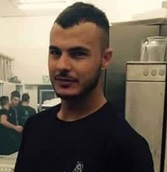
Anwar Salaima 22
Israeli soldiers shot and killed, on Wednesday at dawn, a young Palestinian man, and injured another, after the army fired several live rounds at a Palestinian car in the town of ar-Ram, north of occupied East Jerusalem.
Local sources said three Palestinians were in the car, and did not notice the deployment of Israeli soldiers, who fired many live rounds on the car, killing Anwar Salaima, 22, and seriously wounding Fares Khader Resheq, 20, while the kidnapped Palestinian has been identified as Mohammad Nassar, 20.
Red Crescent Ambulances rushed to the scene of the shooting, but the soldiers refused to allow them through. Salaima was still breathing, and bled to death after the soldiers refused to allow the medics to approach him.
The slain Palestinian, and the wounded, were shot by the soldiers, from a relatively close range.
Eyewitnesses in ar-Ram said dozens of soldiers and army vehicles invaded the town, at dawn, and closed its main road, before demolishing a blacksmith’s workshop.
They added that clashes took place in the area, and extended to Bank of Jordan Street, and a local bakery, in addition to al-Kassarat Street and Wadi Ayyad neighborhood.
The soldiers fired dozens of gas bombs, concussion grenades, rubber-coated steel bullets and live rounds, and also kidnapped one Palestinian, and took him to an unknown destination.
Israeli soldiers shot and killed, on Wednesday at dawn, a young Palestinian man, and injured another, after the army fired several live rounds at a Palestinian car in the town of ar-Ram, north of occupied East Jerusalem.
Local sources said three Palestinians were in the car, and did not notice the deployment of Israeli soldiers, who fired many live rounds on the car, killing Anwar Salaima, 22, and seriously wounding Fares Khader Resheq, 20, while the kidnapped Palestinian has been identified as Mohammad Nassar, 20.
Red Crescent Ambulances rushed to the scene of the shooting, but the soldiers refused to allow them through. Salaima was still breathing, and bled to death after the soldiers refused to allow the medics to approach him.
The slain Palestinian, and the wounded, were shot by the soldiers, from a relatively close range.
Eyewitnesses in ar-Ram said dozens of soldiers and army vehicles invaded the town, at dawn, and closed its main road, before demolishing a blacksmith’s workshop.
They added that clashes took place in the area, and extended to Bank of Jordan Street, and a local bakery, in addition to al-Kassarat Street and Wadi Ayyad neighborhood.
The soldiers fired dozens of gas bombs, concussion grenades, rubber-coated steel bullets and live rounds, and also kidnapped one Palestinian, and took him to an unknown destination.
12 july 2016
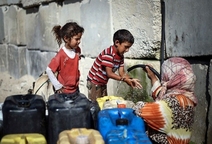
The Turkish Minister of Forestry and Water Affairs announced, Tuesday, that Turkey is to establish a seawater desalination plant to solve water crisis, estimating the coast of the project to $300,000,000 USD.
The minister noted, according to Al Ray, that the project is big-ticket, noting that some countries announced that they will contribute to the project.
Gaza water infrastructure has shuddered under the burden of an almost decade-long Israeli-Egyptian siege.
Three major Israeli wars on Gaza since 2008 have only exacerbated the problem, with jets bombing every square kilometre of the strip, inflicting damage onto reservoirs above and pipelines below the ground.
The director of Coastal Municipalities Water Utility in Gaza explained that the proportion of groundwater that is unfit for drinking is more than 97%.
09/03/15 United Nations: Gaza Could Be Uninhabitable Within 5 Years
He added that the amount of chloride in the groundwater is higher than the normal average according to the Palestinian specification and the standards of World Health Organization which estimated the chloride in the water up to 1.500 milligrams per liter.
However, the standards of World Health organization warns of the increasing of chloride in water to more than 400 milligrams per liter.
The minister noted, according to Al Ray, that the project is big-ticket, noting that some countries announced that they will contribute to the project.
Gaza water infrastructure has shuddered under the burden of an almost decade-long Israeli-Egyptian siege.
Three major Israeli wars on Gaza since 2008 have only exacerbated the problem, with jets bombing every square kilometre of the strip, inflicting damage onto reservoirs above and pipelines below the ground.
The director of Coastal Municipalities Water Utility in Gaza explained that the proportion of groundwater that is unfit for drinking is more than 97%.
09/03/15 United Nations: Gaza Could Be Uninhabitable Within 5 Years
He added that the amount of chloride in the groundwater is higher than the normal average according to the Palestinian specification and the standards of World Health Organization which estimated the chloride in the water up to 1.500 milligrams per liter.
However, the standards of World Health organization warns of the increasing of chloride in water to more than 400 milligrams per liter.
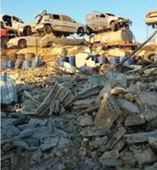
Several Israeli military vehicles, and bulldozers, invaded on Tuesday morning ‘Anata town, northeast of occupied East Jerusalem, and demolished sheds, a farm, a car repair facility and several walls, in addition to closing agricultural roads.
The head of Anata Local Council Taha No’man told the WAFA Palestinian News Agency that the soldiers demolished seven sheds belonging to Bedouin families in the town.
He added that the army also demolished a farm belonging to resident Ahmad al-Hilo, in addition to a car repair center belonging to Ashraf al-Julani.
The army imposed a strict siege on the entire area, after declaring it a closed military zone, and prevented the residents from entering or leaving it.
No’man added that the car repair facility was 230-250 meters, and that the soldiers demolished it without even allowing the owner to remove his machines.
The soldiers also closed several agricultural roads, especially in al-Fheidat and al-Boheira areas, in Anata, after installing sand hills to completely block any access to new construction sites in Anata.
The head of Anata Local Council Taha No’man told the WAFA Palestinian News Agency that the soldiers demolished seven sheds belonging to Bedouin families in the town.
He added that the army also demolished a farm belonging to resident Ahmad al-Hilo, in addition to a car repair center belonging to Ashraf al-Julani.
The army imposed a strict siege on the entire area, after declaring it a closed military zone, and prevented the residents from entering or leaving it.
No’man added that the car repair facility was 230-250 meters, and that the soldiers demolished it without even allowing the owner to remove his machines.
The soldiers also closed several agricultural roads, especially in al-Fheidat and al-Boheira areas, in Anata, after installing sand hills to completely block any access to new construction sites in Anata.
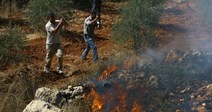
A horde of extremist Jewish settlers on Monday evening set fire to plots of cultivated land in Ras Karkar village, west of Ramallah city.
Afterwards, the settlers obstructed the movement of fire trucks and tried to prevent their crews from extinguishing the flames, according to local eyewitnesses.
The fire caused extensive damage to the agricultural area, which is owned by Palestinian farmers from the village.
Recently, a number of arson attacks on Palestinian homes and property reportedly took place in the West Bank.
Afterwards, the settlers obstructed the movement of fire trucks and tried to prevent their crews from extinguishing the flames, according to local eyewitnesses.
The fire caused extensive damage to the agricultural area, which is owned by Palestinian farmers from the village.
Recently, a number of arson attacks on Palestinian homes and property reportedly took place in the West Bank.
11 july 2016
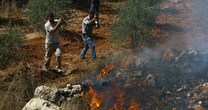
The Environmental Quality Authority said on Monday that Israeli Occupation Forces torched 10 dunums of Palestinians’ agricultural lands planted with olive trees in al-Ramadein village in southern al-Khalil.
The Environmental Quality Authority in al-Khalil city pointed out that the lands torched by Israeli army soldiers belong to the al-Sawadeh Palestinian family in the village which is located within the Separation Wall.
The inhabitants of the village have to get Israeli permits in order to pick the olives every year, the authority added.
It said that the authority’s teams witnessed the effects of fire from a distance since they could not approach the place because of the Separation Wall.
The Environmental Quality Authority in al-Khalil city pointed out that the lands torched by Israeli army soldiers belong to the al-Sawadeh Palestinian family in the village which is located within the Separation Wall.
The inhabitants of the village have to get Israeli permits in order to pick the olives every year, the authority added.
It said that the authority’s teams witnessed the effects of fire from a distance since they could not approach the place because of the Separation Wall.
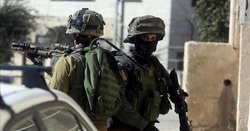
The so called Israel Antiquities Authority (IAA) on Sunday confiscated hundreds of artifacts with a value estimated at one million American dollars from a Palestinian antique shop in al-Wad Street in the Old City of Occupied Jerusalem for allegedly lacking a trade permit.
Talking to Quds Press, the owner of the shop Nabil al-Hroub, 47, refuted the Israeli claim, affirming that it was untrue, and said that his shop is the main income source for one hundred members of al-Hroub family.
He underlined that Israeli authorities practice all forms of pressure on the inhabitants of the Old City for the sake of evacuating it completely.
Israeli authorities have been exercising all kinds of pressure on inhabitants of the Old City in the hope of forcing them out of their town, adding that the inhabitants were ordered under threat not to buy products from his shop over the past few months, the owner pointed out.
Talking to Quds Press, the owner of the shop Nabil al-Hroub, 47, refuted the Israeli claim, affirming that it was untrue, and said that his shop is the main income source for one hundred members of al-Hroub family.
He underlined that Israeli authorities practice all forms of pressure on the inhabitants of the Old City for the sake of evacuating it completely.
Israeli authorities have been exercising all kinds of pressure on inhabitants of the Old City in the hope of forcing them out of their town, adding that the inhabitants were ordered under threat not to buy products from his shop over the past few months, the owner pointed out.
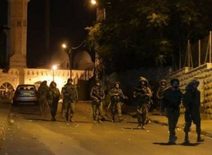
Israeli soldiers invaded, earlier Monday, the village of Orif, south of the northern West Bank city of Nablus, kidnapped four Palestinians, and confiscated two cars, a lathing machine, and a power generator.
The Nablus office of the Palestinian Prisoners Society (PPS) has reported that the soldiers stormed and violently searched many homes, and kidnapped four Palestinians.
The PPS said the kidnaped Palestinians have been identified as Sa’adi Najeh Safadi, Najeh Sa’ad Najeh Safadi, Ali Najeh Sharif Safadi and Essam Najeh Sharif Safadi.
The soldiers also confiscated two cars, belonging to Ali and Essam, in addition to confiscating a lathing machine and a power generator.
The Nablus office of the Palestinian Prisoners Society (PPS) has reported that the soldiers stormed and violently searched many homes, and kidnapped four Palestinians.
The PPS said the kidnaped Palestinians have been identified as Sa’adi Najeh Safadi, Najeh Sa’ad Najeh Safadi, Ali Najeh Sharif Safadi and Essam Najeh Sharif Safadi.
The soldiers also confiscated two cars, belonging to Ali and Essam, in addition to confiscating a lathing machine and a power generator.
9 july 2016
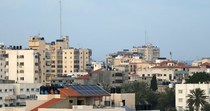
The Palestinian government revealed that donor countries paid only 40% of total aid commitments towards Gaza reconstruction after Israel’s 2014 aggression on the Strip.
The Palestinian national team for Gaza reconstruction said only $1.4 billion were paid out of $5.4 billion pledged by donor countries during Gaza reconstruction conference in Cairo.
State of Kuwait's grant to Palestine, amounting to US$ 200 million, is considered the highest, the team said in its report.
The PA government has recently reached an agreement with the Islamic Bank for Development and the state of Qatar to facilitate Gaza reconstruction funding. 171,000 Palestinian houses damaged during the 51-day aggression on Gaza are still in need for reconstruction, according to the report.
Gaza’s agricultural sector suffered losses and damages that exceeded $250 million. Only $75.4 million were provided for its reconstruction. 5,153 facilities of the economic sector were also damaged during the aggression.
The report also pointed to the development made in educational sector where 96% of the damaged public schools, 100% of UNRWA schools, 50% of universities, and 66% of kindergartens were rebuilt after being partially or totally destroyed during the aggression.
In July 2014, Israel launched an offensive on the besieged coastal enclave, which killed over 2,300 Palestinians, mostly civilians.
The Palestinian national team for Gaza reconstruction said only $1.4 billion were paid out of $5.4 billion pledged by donor countries during Gaza reconstruction conference in Cairo.
State of Kuwait's grant to Palestine, amounting to US$ 200 million, is considered the highest, the team said in its report.
The PA government has recently reached an agreement with the Islamic Bank for Development and the state of Qatar to facilitate Gaza reconstruction funding. 171,000 Palestinian houses damaged during the 51-day aggression on Gaza are still in need for reconstruction, according to the report.
Gaza’s agricultural sector suffered losses and damages that exceeded $250 million. Only $75.4 million were provided for its reconstruction. 5,153 facilities of the economic sector were also damaged during the aggression.
The report also pointed to the development made in educational sector where 96% of the damaged public schools, 100% of UNRWA schools, 50% of universities, and 66% of kindergartens were rebuilt after being partially or totally destroyed during the aggression.
In July 2014, Israel launched an offensive on the besieged coastal enclave, which killed over 2,300 Palestinians, mostly civilians.
8 july 2016
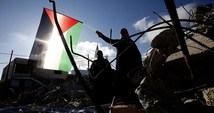
The Israeli occupation authorities (IOA) on Thursday ordered the family of the Palestinian detainee Ahmad Abu Zaid to evacuate their home pending its demolition in ten days.
The Israeli Supreme Court turned down on appeal filed by the family to cancel the demolition order.
The IOA set a 10-day deadline for the evacuation of the family home, which covers 100 square meters and shelters 10 members. The demolition also targets four shops in the ground floor.
The order was issued on allegations that prisoner Abu Zaid assisted three youths who carried out an anti-occupation stabbing attack in Jerusalem’s Bab al-Amoud area some five months ago. The three youngsters were killed by the Israeli army right on the spot.
The Israeli Supreme Court turned down on appeal filed by the family to cancel the demolition order.
The IOA set a 10-day deadline for the evacuation of the family home, which covers 100 square meters and shelters 10 members. The demolition also targets four shops in the ground floor.
The order was issued on allegations that prisoner Abu Zaid assisted three youths who carried out an anti-occupation stabbing attack in Jerusalem’s Bab al-Amoud area some five months ago. The three youngsters were killed by the Israeli army right on the spot.
6 july 2016
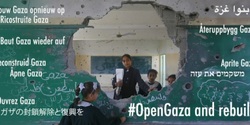
Two years since the outbreak of the 2014 war that cost the lives of 2,492 Palestinian civilians, including 551 children, much of the Gaza Strip remains in ruins.
Entire neighborhoods remain cut off from water supplies, destroyed hospitals and clinics have not yet been rebuilt, and tens of thousands remain without a home.
While some reconstruction has progressed, the situation in Gaza remains dire. Less than 10% of the 11,000 homes that were completely destroyed during the 51 day bombardment have been rebuilt. As a result of the war and the impact of the blockade imposed in 2007 by Israel, more than 75,000 Palestinians in Gaza still have no home to return to.
“Two years since the beginning of the war, the blockade is severely impeding reconstruction and recovery in Gaza. Unless it is lifted, Palestinians living in Gaza will be unable to move on with their lives and live in freedom, dignity, and safety,” Oxfam Country Director Chris Eijkemans said, according to the PNN.
“When the ceasefire began, world leaders promised to work towards sustainable and long-term development for Palestinians living in Gaza. However, there is little evidence of those promises on the ground.”
International organizations working in the occupied Palestinian territory are sounding the alarm on the lack of progress in Gaza’s reconstruction as a result of Israel’s heavy restrictions on the entry of materials critical to the recovery process. The organizations called on world leaders to live up to their commitments and press for an immediate end to the blockade.
The almost decade long blockade has crippled Gaza’s economy. Without the ability to sell to external markets, private sector employment has plummeted. Overall unemployment is above 40%, with Gaza’s youth unemployment among the highest in the world.
The impact of the blockade on children is particularly devastating, and tens of thousands of children remain without a home as a result of the 2014 conflict. “Half of Gaza’s population are children, many of whom have lived their whole life under blockade. Hundreds of children requiring vital medical treatment are prevented from leaving Gaza. Two years on, the root causes of their suffering have still not been addressed,” said Fikr Shalltoot, Director of Programmes in Gaza for Medical Aid for Palestinians.
Mr Eijkemans said that lifting the blockade is the only solution to give people access to the basic services they desperately need, to allow reconstruction to proceed in full, and to allow Gaza’s crippled economy to restore.
“The blockade is illegal under international law and amounts to collective punishment of an entire population. Only its immediate end will bring about long-term security for Palestinians and Israelis alike.”
According to UN statistics, Palestinians now make up the largest percentage of refugees in the entire world.
Entire neighborhoods remain cut off from water supplies, destroyed hospitals and clinics have not yet been rebuilt, and tens of thousands remain without a home.
While some reconstruction has progressed, the situation in Gaza remains dire. Less than 10% of the 11,000 homes that were completely destroyed during the 51 day bombardment have been rebuilt. As a result of the war and the impact of the blockade imposed in 2007 by Israel, more than 75,000 Palestinians in Gaza still have no home to return to.
“Two years since the beginning of the war, the blockade is severely impeding reconstruction and recovery in Gaza. Unless it is lifted, Palestinians living in Gaza will be unable to move on with their lives and live in freedom, dignity, and safety,” Oxfam Country Director Chris Eijkemans said, according to the PNN.
“When the ceasefire began, world leaders promised to work towards sustainable and long-term development for Palestinians living in Gaza. However, there is little evidence of those promises on the ground.”
International organizations working in the occupied Palestinian territory are sounding the alarm on the lack of progress in Gaza’s reconstruction as a result of Israel’s heavy restrictions on the entry of materials critical to the recovery process. The organizations called on world leaders to live up to their commitments and press for an immediate end to the blockade.
The almost decade long blockade has crippled Gaza’s economy. Without the ability to sell to external markets, private sector employment has plummeted. Overall unemployment is above 40%, with Gaza’s youth unemployment among the highest in the world.
The impact of the blockade on children is particularly devastating, and tens of thousands of children remain without a home as a result of the 2014 conflict. “Half of Gaza’s population are children, many of whom have lived their whole life under blockade. Hundreds of children requiring vital medical treatment are prevented from leaving Gaza. Two years on, the root causes of their suffering have still not been addressed,” said Fikr Shalltoot, Director of Programmes in Gaza for Medical Aid for Palestinians.
Mr Eijkemans said that lifting the blockade is the only solution to give people access to the basic services they desperately need, to allow reconstruction to proceed in full, and to allow Gaza’s crippled economy to restore.
“The blockade is illegal under international law and amounts to collective punishment of an entire population. Only its immediate end will bring about long-term security for Palestinians and Israelis alike.”
According to UN statistics, Palestinians now make up the largest percentage of refugees in the entire world.
5 july 2016
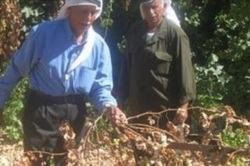
A number of extremist Israeli colonists destroyed, Monday, several grapevines, a shed and uprooted plants, belonging to a Palestinian farmer in the Zeitouna area, isolated, between the illegal Israeli colonies of Daniel and Eliezer, built on Palestinian lands, in al-Khader town, south of the West Bank city of Bethlehem.
Ahmad Salah, the coordinator of the Popular Committee against the Wall and Colonies in al-Khader, said the assailant broke the main gate leading to the Palestinian land, uprooted grapevine shrubs and cut their arbors.
“This was not the first attack of its kind; the area has been subject to constant similar assaults,” he said, “They want the Palestinian to abandon their lands in order to expand the illegal colonies that surround them.”
Ahmad Salah, the coordinator of the Popular Committee against the Wall and Colonies in al-Khader, said the assailant broke the main gate leading to the Palestinian land, uprooted grapevine shrubs and cut their arbors.
“This was not the first attack of its kind; the area has been subject to constant similar assaults,” he said, “They want the Palestinian to abandon their lands in order to expand the illegal colonies that surround them.”
2 july 2016
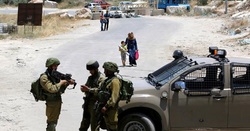
The Israeli government has decided to reduce the monthly transfers of tax funds collected on behalf of the Palestinian Authority and to impose a tight military blockade on al-Khalil province in response to a recent wave of Palestinian attacks against settlers in the West Bank.
The Israeli army, in turn, started to deploy two additional battalions in the West Bank to boost its military presence and provide more protection for Jewish settlers.
More troops were sent, in particular, to al-Khalil province to encircle the city and its towns and refugee camps after local young men carried out deadly attacks against Israelis.
According to the Palestinian Information Center (PIC) reporter in the province that the Israeli army closed several areas in al-Khalil with mounds of dirt and military barriers, including in Bani Na'im town, al-Fawwar refugee camp, al-Dhahiriya town and as-Samua town.
The Israeli army also declared Bani Na'im a closed military zone and decided to withdraw all Jerusalem entry permits from its residents.
East of al-Khalil, a large number of Israeli troops stormed Deir Razeh town and carried out house-to-house searches. A similar campaign took place in Wadi al-Shajna village near al-Khalil.
The Israeli army, in turn, started to deploy two additional battalions in the West Bank to boost its military presence and provide more protection for Jewish settlers.
More troops were sent, in particular, to al-Khalil province to encircle the city and its towns and refugee camps after local young men carried out deadly attacks against Israelis.
According to the Palestinian Information Center (PIC) reporter in the province that the Israeli army closed several areas in al-Khalil with mounds of dirt and military barriers, including in Bani Na'im town, al-Fawwar refugee camp, al-Dhahiriya town and as-Samua town.
The Israeli army also declared Bani Na'im a closed military zone and decided to withdraw all Jerusalem entry permits from its residents.
East of al-Khalil, a large number of Israeli troops stormed Deir Razeh town and carried out house-to-house searches. A similar campaign took place in Wadi al-Shajna village near al-Khalil.
30 june 2016
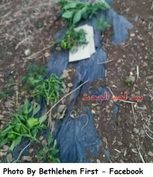
A number of fanatic Israeli colonists attacked, late on Wednesday evening, Palestinian hothouses, and wrote racist graffiti, in addition to uprooting plants, in Wadi Fukin village, west of the West Bank district of Bethlehem.
Ahmad Sukkar, the head of Wadi Fukin Village Council, told the WAFA Palestinian News Agency that the fanatics infiltrated into Palestinian farmlands, in the al-Fawwar area, south of the village, and destroyed two hothouses, in addition to uprooting dozens of plants, owned by Maher Assaf and Jamil Assaf.
Sukkar added that the assailants also uprooted plants in lands owned by Mohammad Saleh Assaf and Na’im Daoud ‘Ateyya, in addition to writing racist graffiti, including “death to Arabs.”
He also stated that the village has been subject to frequent similar assaults, carried out by extremists of the nearby Beitar Illit colony, illegally built on Palestinian lands owned by residents of Husan, Nahhalin and Wadi Fukin.
Ahmad Sukkar, the head of Wadi Fukin Village Council, told the WAFA Palestinian News Agency that the fanatics infiltrated into Palestinian farmlands, in the al-Fawwar area, south of the village, and destroyed two hothouses, in addition to uprooting dozens of plants, owned by Maher Assaf and Jamil Assaf.
Sukkar added that the assailants also uprooted plants in lands owned by Mohammad Saleh Assaf and Na’im Daoud ‘Ateyya, in addition to writing racist graffiti, including “death to Arabs.”
He also stated that the village has been subject to frequent similar assaults, carried out by extremists of the nearby Beitar Illit colony, illegally built on Palestinian lands owned by residents of Husan, Nahhalin and Wadi Fukin.
